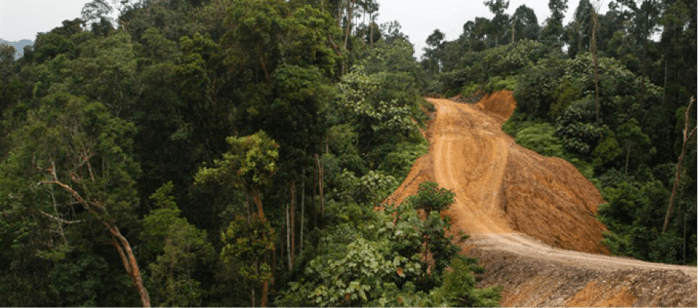 Jessie was a post-doctoral researcher working on ecosystem services and landscape planning in Borneo, as part of the Borneo Futures Project in collaboration with other scientists and NGOs. Concurrently, she was working on watershed ecosystem services in Tanzania and Laos, with James Watson and Joseph Maina from ARC-CEED and the Wildlife Conservation Society; and on integrating watershed services into planning for forestry landscapes in Indonesia and Latin America with the SNAP working group on tropical forestry
Jessie was a post-doctoral researcher working on ecosystem services and landscape planning in Borneo, as part of the Borneo Futures Project in collaboration with other scientists and NGOs. Concurrently, she was working on watershed ecosystem services in Tanzania and Laos, with James Watson and Joseph Maina from ARC-CEED and the Wildlife Conservation Society; and on integrating watershed services into planning for forestry landscapes in Indonesia and Latin America with the SNAP working group on tropical forestry
Her research focused on understanding flows of ecosystem services (especially freshwater), local people’s perceptions and needs for these services, and on landscape planning for multiple objectives including biodiversity conservation, ecosystem services and equitable development. Key collaborators: Dr. Kerrie Wilson, Professor Hugh Possingham , and Erik Meijaard.
Previous research topics include the functional diversity of plant traits, seed dispersal, secondary rainforest regeneration, estimating biodiversity metrics for conservation planning, and development of statistical methods.
In 2012, Jessie completed her PhD in rainforest ecology at the University of Queensland, studying seed dispersal and the functional diversity of rainforest regeneration after clearance. When not researching rainforests or ecosystem services, she volunteers for Oxfam Australia in the area of climate change advocacy, and helps to co-ordinate volunteer initiatives in Queensland.
Postdoctoral Research Fellow, ARC Centre of Excellence for Environmental Decisions, University of Queensland
Research themes and projects
Ecosystem Services and Biodiversity Conservation
Email: jessie.wells@uq.edu.au

Roads and intensive logging can cause severe erosion and high flows of sediment to rivers, especially in mountainous terrain – leading to loss of ecosystem services such as freshwater and flood regulation. Some roads form vital connections for local people, but most are built for logging and coal transport. Photo: UNEP GRID-Arendal
Research Interests:
Quantifying and mapping ecosystem services
- integrating models of ecosystem processes with studies of benefit flows to people
- roles of forest ecosystems in climate mitigation and adaptation.
Decision-making for multiple objectives: ecosystem services, biodiversity and development
- systematic conservation planning in multi-functional landscapes and seascapes, incorporating objectives for biodiversity, ecosystem services and economic development, with equity in the distributions of costs and benefits across stakeholders.
- processes for decision making, planning and monitoring that include local perspectives and knowledge, ranging from interview surveys through to participatory modelling and decision making.
Decision-making in the presence of risk and uncertainties
- for example, uncertainties in current observations and future changes in climate.
Acting and Learning through time: active adaptive management of ecosystems
- balancing the needs to act now, and to learn about the system to improve future actions.
Ecosystem functional diversity and responses to disturbance.
- spatial and temporal dynamics of rainforest regeneration after disturbance, including changes in the representation of ecological traits and dispersal interactions.
- the potential and limitations of natural regeneration and restoration plantings for conservation of rainforest species and functional diversity.
Publications
Wells, J.A, Meijaard, E., Abram, N.K., Wich, S.A. (2013) Forests, Floods, People and Wildlife on Borneo. United Nations Environment Program, Nairobi, Kenya. 54 pages. View online
Runting, R.K., E. Meijaard, N.K. Abram, J.A. Wells, D.G. Gaveau, M. Ancrenaz, H.P. Possingham, S.A. Wich, F. Ardiansyah, M.T. Gumal, L.N. Ambu, and K.A Wilson. (Accepted 03/03/02015) Alternative futures for Borneo show the value of integrating economic and conservation targets across borders. Nature Communications #NCOMMS-13-11526B
Abram, N. K., Meijaard, E., Wells, J. A., et al. (2015). Mapping perceptions of species’ threats and population trends to inform conservation efforts: the Bornean orangutan case study. Diversity and Distributions. Early View DOI: 10.1111/ddi.12286 View online
Pellier, A.-S., J. A. Wells, N. K. Abram, and E. Meijaard (2014). Borneo’s environmental present and future seen through children’s eyes. PLoS ONE View online
Media: Jakarta Globe, Mongabay, Reuters Video and drawings – CIFOR
Mills, M., Nicol, S., Wells, J., Lahoz-Monfort, J., Wintle, B., Bode, M., Wardrop, M., Walshe, T., Probert, W., Runge, M., Possingham, H., McDonald-Madden, E. (2014). Minimizing the cost of keeping your options open. Conservation Biology 28 (3) 646-653 View online
Abram, N. K., E. Meijaard, M. Ancrenaz, R. K. Runting, J. A. Wells, D. L. A. Gaveau, A.-S. Pellier, and K. Mengersen. (2014). Spatially explicit perceptions of ecosystem services and land cover change in forested regions of Borneo. Ecosystem Services 7: 116-127 View online)
Full list of publications:

You must be logged in to post a comment.